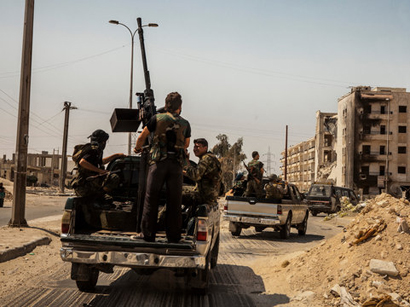The Syrian army, backed by Hezbollah militants, has regained control of the strategic town of al-Kussair near the Lebanon border following weeks of fighting, state media and the opposition said Wednesday, dpa reported.
The army said the "victory in al-Kussair is a clear message" to what it called enemies of Syria, mainly Israel and "its agents in the region," the state news agency SANA reported.
Al Manar TV, affiliated with the Lebanese militant group Hezbollah, aired footage from al-Kussair allegedly showing government troops hoisting the Syrian flag in a public square.
Al-Kussair is near the highway that connects the capital Damascus with the government-held coastal cities of Latakia and Tartous. The rebels reportedly used the town as a supply route from Lebanon.
The rebel-linked Coordination Committee of al-Kussair confirmed the retreat by opposition forces from the town.
"In the face of an enormous arsenal, the fighters had to withdraw due to a lack of supplies and flagrant intervention by Hezbollah," the group posted on Facebook.
The main opposition Syrian National Coalition warned of the potential for "horrendous and mass massacres" after the takeover. Local activist Hadi al-Abdallah told Al-Arabiya television that 15,000 locals were trapped on the outskirts of the town.
"We are surrounded on all sides and there is no safe passage to evacuate the wounded or the injured," he told the Dubai-based broadcaster.
The United States condemned the assault and called on the Syrian government and others for safe passage for humanitarian organizations.
"It is clear that the regime could not contest the opposition's control of Kussair on its own, and is depending upon Hezbollah and Iran to do its work for it in Kussair," White House spokesman Jay Carney said. He warned of the threat to Lebanon and called on Hezbollah and Iran to withdraw their fighters from Syria.
Hezbollah party's deputy chief Sheikh Naim Qassem declared the victory in al-Kussair a "serious blow" to America, Israel, and "takfiris" - the radical jihadist rebels who condemn their opponents as apostates.
In Lebanon, Syrian forces carried out an air raid on the northeastern town of Arsal, with Lebanese media reporting that helicopters fired two rockets on the house of a known sympathizer of the Syrian rebels.
The attack was condemned by Lebanese President Michel Suleiman, who urged Syria to "respect Lebanon's sovereignty and not to endanger its citizens."
France's confirmation of the use of chemical weapons in Syria would "oblige the international community to act," President Francois Hollande said in Paris. He warned that any action in Syria would require "an international legal framework."
He said the results, which France handed to the UN, would add to the "pressure which must be applied to the Syrian regime and its allies." The findings released Tuesday showed there was "no doubt" President Bashar al-Assad's regime was to blame in at least one case.
The US reacted cautiously to the French announcement, demanding more evidence about when and where the weapons were used.
US Secretary of State John Kerry stressed that President Barack Obama had a range of options available on Syria and that his opposition to the use of chemical weapons was real.
"Make no mistake whatsoever. The president's red line is real," Kerry said in Guatemala.
In Geneva, the United Nations-Arab League envoy for Syria, Lakhdar Brahimi, said a proposed peace conference backed by Russia and the United States would not take place before July, a month later than initially planned.
Further preparatory talks would take place June 25, Brahimi said, after meeting senior US and Russian officials.
Brahimi said the Syrian opposition still had a lot of work to do to get ready for the conference. "And until the opposition is ready, all we can do is wait."
Damascus has announced its readiness to attend the conference without conditions. But the opposition has said it would only attend if President Bashar al-Assad agrees to step down and Hezbollah withdraws.
Brahimi said the aim of the conference, called Geneva II, would be a comprehensive peace deal between the Syrian government and opposition and an agreement on a transition government.
Arab foreign ministers meeting at the Cairo-based Arab League announced their backing for the conference and condemned "all forms of foreign intervention" in Syria.
Lebanese Foreign Minister Adnan Mansour said his country had ensured that the meeting did not condemn Hezbollah, whose forces, he added, were in al-Kussair "to protect Lebanese civilians."
Arab League Secretary General Nabil al-Arabi said that while the Geneva plan called for a transitional administration with full powers, whether Bashar al-Assad resigned immediately as president "will be decided by the Syrians."






